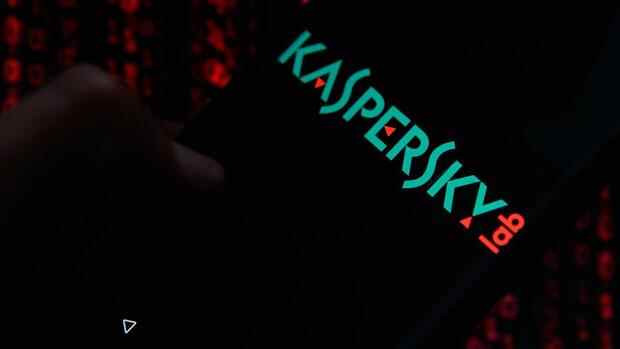The German authorities warn against the use of Russian security software.
(Photo: imago images/ZUMA Wire)
Dusseldorf, Berlin Kaspersky is a well-known name in Germany, and the Russian software manufacturer’s IT security solutions are widespread. On the recommendation of the Federal Office for Information Security (BSI), private users and companies should now look for an alternative: the top state cyber protectors warn in clear terms against the use of anti-virus programs from Russia.
In the course of the invasion of Ukraine, Russia also threatened the EU, NATO and the Federal Republic of Germany, the authority wrote in a press release on Tuesday. There is a “considerable risk of a successful IT attack”. The BSI sees a real chance that the Russian regime could involve IT providers like Kaspersky in an attack.
In the statement, the authority writes: “A Russian IT manufacturer can carry out offensive operations itself, be forced to attack target systems against its will, or be spied on as a victim of a cyber operation without its knowledge, or be used as a tool for attacks against its own customers will.”
Kaspersky considers the warning to be unjustified. “We believe that this decision is not based on the technical evaluation of Kaspersky products – which we have repeatedly campaigned for at the BSI and across Europe – but rather was made for political reasons,” Kaspersky wrote in a first one Opinion in the morning.
Top jobs of the day
Find the best jobs now and
be notified by email.
What makes anti-virus software a dangerous gateway: The software requires far-reaching system authorizations in order to be able to identify threats. In addition, it maintains a permanent connection to the manufacturer’s server in order to regularly download information about new threats.
“If there are doubts about the reliability of the manufacturer, virus protection software poses a particular risk for an IT infrastructure that is to be protected,” concludes the BSI. In the worst case, the manufacturer could install spyware or sabotage software directly into the customer’s systems.
Critical infrastructure at risk
The authority emphasizes that all Kaspersky users are potentially affected. Companies and authorities with special security interests and operators of critical infrastructure are particularly at risk – this should apply to the manufacturers of weapon systems as well as to energy suppliers.
The recommendation to replace the products from the Kaspersky portfolio is likely to pose some problems for companies. The introduction of new software involves a great deal of effort, from the selection of the right solutions to tests and implementation at all locations.
More: Federal government registers significantly more incidents in critical infrastructure.
Kaspersky is a well-known name in Germany, and the Russian software manufacturer’s IT security solutions are widespread. On the recommendation of the Federal Office for Information Security (BSI), private users and companies should now look for an alternative: the top state cyber protectors warn in clear terms against the use of anti-virus programs from Russia.
In the course of the invasion of Ukraine, Russia also threatened the EU, NATO and the Federal Republic of Germany, the authority wrote in a press release on Tuesday. There is a “considerable risk of a successful IT attack”. The BSI sees a real chance that the Russian regime could involve IT providers like Kaspersky in an attack.
In the statement, the authority writes: “A Russian IT manufacturer can carry out offensive operations itself, be forced to attack target systems against its will, or be spied on as a victim of a cyber operation without its knowledge, or be used as a tool for attacks against its own customers will.”
Kaspersky feels unfairly persecuted. “We believe that this decision is not based on the technical evaluation of Kaspersky products – which we have repeatedly campaigned for at the BSI and across Europe – but rather was made for political reasons,” Kaspersky wrote in a first one Opinion.
What makes anti-virus software a dangerous gateway: The software requires far-reaching system authorizations in order to be able to identify threats. In addition, it maintains a permanent connection to the manufacturer’s server in order to regularly download information about new threats.
“If there are doubts about the reliability of the manufacturer, virus protection software poses a particular risk for an IT infrastructure that is to be protected,” concludes the BSI. In the worst case, the manufacturer could install spyware or sabotage software directly into the customer’s systems.
Critical infrastructure at risk
The authority emphasizes that all Kaspersky users are potentially affected. Companies and authorities with special security interests and operators of critical infrastructure are particularly at risk – this should apply to the manufacturers of weapon systems as well as to energy suppliers.
The recommendation to replace the products from the Kaspersky portfolio is likely to pose some problems for companies. The introduction of new software involves a great deal of effort, from the selection of the right solutions to tests and implementation at all locations.
More: Federal government registers significantly more incidents in critical infrastructure.
